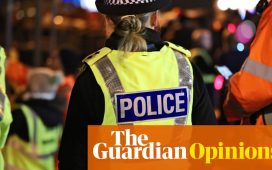A document from Prevent, the official scheme to stop radicalisation, includes believing in socialism, communism, anti-fascism and anti-abortion in a list of potential signs of ideologies leading to terrorism.
It comes as the Conservative government considers widening what it will consider to be extremism.
The document is part of online Prevent awareness training for those covered by the duty to inform if they suspect radicalisation. That includes teachers and youth workers.
The guidance was updated last year and published with little or no fanfare, after William Shawcross’s controversial government-ordered report on Prevent was released.
A former head of counter-terrorism said it risked damaging Prevent, and human rights groups said the government was playing political games under the guise of stopping terrorism.
In a section on the left wing it states: “Two broad ideologies: socialism and communism. Each are united by a set of grievance narratives which underline their cause.”
In a section on single-issue ideologies, the document reads: “Narratives are likely to come from those who seek to change a specific policy or practice, as opposed to replacing the whole economic, political or social system. Examples include animal rights, anti-abortion or anti-fascism. Single-issue narratives can be politically agnostic, meaning they may be neither right nor left aligned.”
Neil Basu, a former police head of counter-terrorism, said: “That is far too nebulous, and there is no qualification. It might lead to unforeseen consequences such as overwhelming the system and bringing the system into disrepute.
“The reputation of Prevent is still very fragile. It makes the haystack unnecessarily bigger in which you are trying to find the needle.”
Those completing the online course get a certificate to say they have awareness of Prevent.
The government commissioned a review of Prevent by Shawcross, whose appointment led to a boycott of the review because of his alleged anti-Muslim and rightwing views.
The guidance for those covered by the Prevent duty was updated afterwards in July 2023.
The document details the main two ideologies driving the terrorist threat to the UK: Islamism, which makes up the bulk of the caseload, and the extreme right wing, which makes up about 20-30% of the caseloads, according to counter-terrorism sources.
A Home Office spokesperson said: “Prevent deals with all forms of radicalisation and it is important that this is effectively communicated within our training products so that frontline professionals are equipped to take the appropriate action.
“All training products are regularly updated to ensure they are reflecting the latest threat picture.”
Jacob Smith, from Rights and Security International, a human rights advocacy group, said: “For years, we have expressed concern about how the government’s broad concept of ‘extremism’ could be open to politicised abuses. It appears that this concern has now been realised through a blatant distinction between how the government wants to treat people on the ‘left’ versus people on the ‘right’ under Prevent.
“Our concern is only heightened by government rhetoric during the past few days that appears to be targeting British Muslims and protesters for Palestinian rights. If ‘extremism’ can mean anything the government wants it to mean, that’s a clear problem for democracy.”
Ilyas Nagdee, from Amnesty International, said: “This is yet another crackdown from the UK government to stifle freedom of expression – including political speech and activism – using the blunt instrument that is Prevent.
“Prevent is brazenly being used here to target political expression as it has long been criticised of doing. The government should not be in the business of rolling out training and guidance on what they deem acceptable or unacceptable political ideologies and forms of activism.”
Other official training documents for Prevent state that “under the Prevent duty” those covered by it must “support” anyone at risk of radicalisation.
It says: “It’s not your responsibility to risk assess the level of radicalisation,” and urges providing “as much context as possible before it’s shared with the police”.
Other official material says details that should be provided to the authorities about anyone being referred to Prevent should include name, religion, social media name, ethnicity, nationality, main language, immigration or asylum status, and any additional family details. It also says data that can be shared can include, neurodivergence, mental health, details about emotional health and cultural factors.
It also asks any referral includes details of the “ideology of concern … provide details of the ideology which may be contributing to making the person susceptible to radicalisation”.
“This training is designed to make sure that when you share a concern that a person may be being radicalised into terrorism: it’s informed; it’s with good intention; the response to that concern is considered, and proportionate.”











